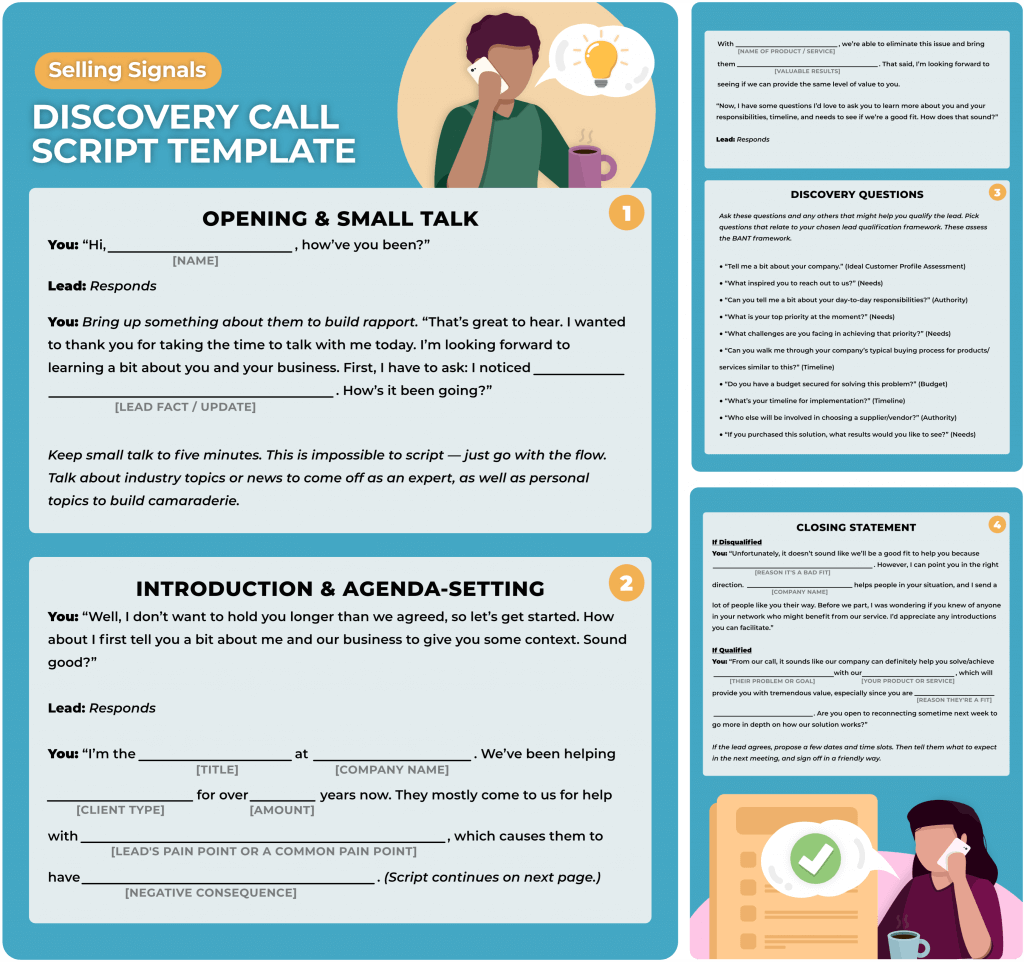-
News & Trends -
Sales -
Marketing Related Topics -
B2B Software Guides Related Topics -
Free Tools & Resources -
- About Us About Us


A discovery call script is a guide that salespeople use to qualify a lead during a phone call. In addition to helping you prepare for the call, a script provides a list of discovery questions to qualify your leads and verbiage that excites potential buyers about the product or service. A quality general script will work for almost all cases, but you can use a tailored one that fits your specific business type or the discovery question framework you want to use.
Below is our free general discovery call script template you can customize to fit your business, situation, and lead by filling in the blanks and adjusting the questions. The script follows the standard discovery call script structure and uses the BANT qualification framework by asking questions to reveal information about leads' budget, authority, needs, and timeline. We’ve also crafted other templates that work for specific sales scenarios. Jump to see them below.

A standard discovery call script will begin with a rapport-building opening followed by small talk, introductions, and agenda-setting before listing discovery questions. The script ends with two closing options for two outcomes: qualified or unqualified. This structure works to build a relationship with the potential buyer while achieving its main function of lead qualification.
Your opener consists of a basic greeting like “how’ve you been?” and a more strategic conversational question that will initiate small talk, usually regarding something you learned about the lead during your pre-call research or a past call. It could be their hobby, a recent vacation, or industry news. A rapport-building opener like this shows the lead that you’ve done your homework and also provides you both with an easy avenue for connection.
Now that you understand what to include in a discovery call script and in which order, let's get into how to write your own script.
Creating your own master discovery call script that you can tailor to fit different leads is a good way to standardize and optimize your lead qualification process. To do so, start by understanding your ideal customer by crafting a customer profile and buyer persona. Next, pick a lead qualification framework and choose 8–10 questions you’ll ask leads during the call. Finally, write the other components of the script and practice until it becomes second nature.
First build your customer profile, which describes your ideal corporate or individual customer using hard data like demographics, psychographics, and firmographics. Use it to create buyer personas: semi-fictitious representations of real people you’d sell to that outline their pain points and motivations. Both are meant to help you assess a lead’s level of fit with your business. They’ll also help you craft verbiage that speaks to the lead’s interests, role, pains, and desires.
Even if a person and their company fit the buyer persona and customer profile, there are still other qualification factors you must take into account on your discovery calls, such as their budget, decision-making power, and timeline. Lead qualification frameworks are the set of criteria that you check off as you qualify a lead. The first criterion (the first letter in the acronym) is what you ask about to start. It takes priority in your qualification process.
Here are some examples of qualification frameworks and who should use them:
Choosing your framework will guide you in selecting the questions to ask in the next step, as you’ll know what intel you must uncover from your leads to determine if they’ve passed or failed the framework’s assessment. You can always go back and change your framework later on if it’s yielding too many false qualifications. For now, stick with one and build your list of questions. We’ll give you scripts for CHAMP and GPCTBA/C&I later in the article.
Now that you know what qualified looks like, form a list of questions to include in your script. If you're in B2B sales, start with two questions about the person’s company and role so you can assess their match with your customer profile and buyer persona. From there, write out 8–10 questions, two for each criterion in your chosen lead qualification framework. If you’re using BANT, you’d write two questions about budget first, then authority, and so on.
Below are some questions covering all the criteria from the three frameworks in the last step:
Now take the 8–10 questions and write them down in a document for later. Keep in mind that during a call, you might want to go off-script a little for the sake of conversation. It’s advised to ask an unscripted question to dig into one of their answers every once in a while, as long as you still get a clear answer for each of your chosen criteria.
With 8–10 questions selected, you can start to write out your script, leaving blanks for parts that change for each lead, like {Lead Name} or {Company Name}. That way reps using it can quickly make a copy of the master document and personalize it before their call with each new lead. The sections of the script include an opener, small talk, introduction, agenda, discovery questions, and a closing statement. The ideal script will be about two pages in length.
Below is a quick reminder of the sections and what to write for each:
Your script should be instructive, but not strict to the point of creative suffocation. Sellers need to have a map but also the ability to go off-script when need be. Also, as you’re writing, especially when crafting your introduction and good-fit closing statement, consult your buyer persona so that you use language that speaks to the desires and frustrations of your leads. That way they’ll be more excited to answer your questions truthfully and commit to next steps if qualified.
Now that you’ve written your script, practice it alone until it becomes locked in your memory. The most important parts to memorize are the introduction, which sells your business, and the questions, which execute your qualification strategy, so you don't sound scripted on the phone. Next, start practicing with peers and colleagues so that you can expose yourself to different responses to your questions.
Read our article on how to conduct a discovery call if you’re ready to put your newly minted script to work. In it you’ll find the step-by-step process for qualifying leads over the phone.
Below are six unique discovery call scripts for salespeople. Two use CHAMP and GPCTBA/C&I qualification frameworks, and the remaining four are purpose-built for specific types of solutions: B2B products, B2B services, B2C products, and B2C services. Each follows the ideal discovery call structure and comes with blanks for personalization, phrasing to help you sell your solution, and questions that will uncover important information for lead qualification.
Who Should Use It: Salespeople that want to understand a lead’s main challenges and how invested they are in overcoming these hurdles before deciding to work with the lead.
Why It Works: This script starts the small talk by asking about a recent event or story in the industry, thereby building you up as an informed expert in the field. Next, it introduces the solution as a means of attaining some goal by overcoming certain challenges. The questions then learn about the challenge and its causes while also exploring the lead’s authority, money, and priorities.
You: Hey {Name}, how’ve you been since we last spoke?
Lead: Responds.
You: Glad to hear it. By any chance did you hear about {Industry Event/News}? Interested in hearing your thoughts.
Lead: Small talk for five minutes.
You: I don’t want to take up too much of your time, as I know you’re likely busy. I’d love the opportunity to first tell you a bit about what we do here at {Company Name}. In sum, we help {Lead’s Job Title} overcome {Typical Challenges} so that they can achieve their goals, whether that be {Typical Goal A} or {Typical Goal B}. We stand out from the other {Company Type} on the market because we focus on {Unique Selling Proposition}. So that’s the high-level view. We can get more into the weeds on another call. For this meeting, I have some questions to ask to ensure we’re the right fit to help you out.
Lead: Responds.
You: Ask down a list of discovery questions. These follow the CHAMP framework.
You: Well, {Name}, thanks for taking the time to answer these questions. I have a much better understanding of your needs and situation now. And I can confidently say that we’re going to be able to help you achieve {Main Goal}. We’ve run out of time. But would you be open to setting up time next week to do a walkthrough of the {Offer}?
Who Should Use It: Salespeople who want to use an exhaustive checklist for lead qualification so that only the highest quality leads enter the sales cycle.
Why It Works: This script works well to build interest around the solution with a pain point-focused introduction. It then uses questions that will help you reveal a lead’s main goals, their plan, and the challenges in frustrating its execution, in turn shining light on why they need you. After forming an understanding of their situation, the questions ask about their timeline, budget, authority, the consequences of not buying, and positive implications of purchasing.
You: Hi {Name}, thanks for clearing time in your schedule to talk. How’s your day been so far?
Lead: Small talk for less than five minutes.
You: Great, I’m excited to share a bit about our company, and, more importantly, to learn more about yours to see if we’re a good fit to help you. To give you some context, we’re a {Company Type} that specializes in helping {Job Title} like you deal with {Pain Point A} and {Pain Point B} so they no longer have {Cost of Pain Points}. Our {Product/Service} does this by {How Solution Works}. Plus, we offer/include {Differentiating Factor}, which enables our customers to enjoy {Benefit}. Now, I have a few questions I wanted to ask you. Alright with you?
Lead: Responds.
You: Run down your list of discovery questions. These follow the GPCTBA/C&I framework.
You: Thanks for taking the time to have this conversation with me. I sure learned a lot about your situation, and I hope you feel as sure as I do at the moment that we’re a good fit for one another. Next steps would be to show you our {Solution} on a longer meeting, where we can really dive in and see if it’s what you’re looking for. Do you have your calendar open?
Who Should Use It: B2B salespeople qualifying a lead for a specific product the lead inquired about or trying to figure out which product will best satisfy their needs.
Why It Works: This script effectively builds hype around the product with the use of a customer-focused story that describes the pains your product solves and the credentials your business holds. After building confidence and excitement around your brand, the script focuses on digging into the problem the company is trying to solve. It also ensures your product has the features and implementation time they’re expecting.
You: Hi {Lead’s Name}, how was {Past Event, Project, Weekend}?
Lead: Small talk for max five minutes.
You: Well, I don’t want to hold you too long. So, let’s get down to business. First off, thank you for taking the time to speak with me today about the possibility of implementing {Product Name} into {Company Name}. I know you learned a bit about what we do on the last call, but I’d like to give you a bit more context so you better understand why I’m asking the questions I ask. That work?
Lead: Agrees.
You: So, {Product Name} came into existence around {Year Founded} because a lot of {Lead Company Type} were really struggling with {Pain Point}, but had no way of dealing with it. Over the past {Number of Years} years, we’ve helped {Number of Clients} {Value Proposition}. This is possible because {How Product Solves Issue}. Any questions for me before we move on?
Lead: Answers.
You: Now, I understand you need help with {Problem}, and I think we could help. But, before I jump to conclusions I want to make sure it’s the right fit. So I have some questions I want to run through with you.
Lead: Responds.
You: Ask down your list of questions. These follow the BANT qualification framework.
You: It sounds like we’re a great fit to help you achieve {Goal}, especially since we {Reason for Fit}. How about we schedule time for next week to do a live demo to show you its abilities?
Who Should Use It: B2C salespeople trying to figure out which product is best for a potential buyer or qualify them for a specific product. Sellers in brick and mortar stores can also succeed with this.
Why It Works: This script first positions your product line as a standout in the market. It then informs the buyer that you’re interested in finding the perfect match for their specific preferences, thereby building trust. Its questions focus on uncovering things like the lead’s price range, authority, needs, product preferences, and preferred timeline, all of which help the seller qualify the lead for a certain product and pitch it to them in a personalized manner.
You: Hi {Name}. How’s the week been treating you so far?
Lead: Small talk for a max of five minutes.
You: Great to hear. Thanks for taking the time to talk with me today about {Product}. I know purchasing a {Item Category — e.g., television, car, etc.} can be a bit of a stressful process. A lot of the people we work with have a bit of trouble figuring out which {Product} is right for them. That said, I’d like to ask you some questions to better understand your budget, preferences, and needs so I can recommend the best option for you. How’s that sound?
Lead: Responds.
You: Great, first let me just give you some context about our store. We specialize in producing top-notch and {Differentiating Adjective — e.g., most affordable, sustainably produced, etc.} {Product}. Customers usually come to us because they’re looking for a {Product Type} that enables them to {Emotionally-Charged Benefit — e.g., keep their family safe, reduce emissions, go on more adventures, etc.,}. That said, I’ve got some questions to ask you before I toot our horn any more.
You: Read down a list of discovery questions. These follow the BANT qualification framework.
You: Alright, I’ve got the perfect {Product Type} for you. It’s right in your price range and packed with the features you love, plus some cool ones you might’ve never heard of before. Would you like to look it over with me now or set up another call to review it in-depth?
Who Should Use It: B2B salespeople qualifying a lead for a service and also attempting to figure out which package or tier is best for their needs.
Why It Works: One of the best ways to warm up any B2B sales call is to ask the buyer something about their current role at the company. After building rapport with this tactic, the script asks probing questions to ensure that this partnership will yield positive results for both parties involved. B2B service relationships often require a lot of back and forth, so it’s important to ensure the client won’t be too costly.
You: Hey {Name}. How’ve you been?
Lead: Responds.
You: Great. Before we jump in, I have to mention that while I was perusing your company website, I noticed you’re in charge of {Unique Responsibility}. I haven’t come across this in my talks with other {Job Title}, so I was wondering if I could ask what it entailed?
Lead: Small talk for five minutes max.
You: Understood. I could talk {Topic} all day, but seeing as though we only have {Duration}, I’d love to get down to business. First off, I think it’d be best if I gave you a quick overview of our company and the service we provide.
You: To start, {Lead’s Company Type} often come to us because they need help tackling {Problem} in order to hit their {Sales, Revenue, Risk Reduction, Efficiency, etc.} goals. What separates us from other {Service Type} is our {Unique Selling Proposition}. Not only does this lead to {Specific Results — e.g., 33% cost reductions}, but also long-term relationships with our clients.
Lead: Responds.
You: From our previous talks and some research we’ve done, I know you need help with {Goal}. Before we go over the services we offer in detail, I think it’d be best if I asked you some questions to ensure that we’re the right team to help your company. Does that sound like a plan?
Lead: Responds.
You: Read down your list of discovery questions. These follow the BANT qualification framework.
You: Wonderful. I think we can provide tremendous value to your business. The fact that you’re in need of {Lead’s Specific Need} and want a partnership that focuses on {Lead’s Prioritized Services} gives me a great feeling that we’re a great fit for you. Would you be open to scheduling a call next week to go over our offering more in-depth?
Who Should Use It: B2C sales professionals trying to see if a potential buyer is a good fit for their service.
Why It Works: This script focuses on telling the lead what pain points you’ll solve for them before you even get into the questions, which will make them more invested in the conversation. It also asks questions that will help you gauge whether your service is a good match with their needs, budget, authority, and timeline, while also influencing the lead to think about how much of a relief having your service would be.
You: Hi {Lead’s Name}, how’s everything going over there in {Location}?
Lead: Small talk ensues for max five minutes.
You: Well, {Name}, thanks for taking the time to speak with me today. I want to use this time wisely to figure out if our service is right for you. Before I get into asking you some questions, I’d love to give you a thousand-foot view of what we do here at {Company Name}.
Lead: Responds.
You: We are the leading {Service Type} in {Region} with a combined {Years of Experience}. Our customers usually struggle with {Pain Point A} and {Pain Point B}, and come to us repeatedly to help them resolve this. Unlike other typical {Company Type}, we focus on {Unique Selling Proposition}, which helps people like you {Benefit}. That said, I’m excited to see if we can achieve such fantastic results for you and your {Home, Family, Financial Situation}. How about I ask some questions to see?
Lead: Responds.
You: Ask down a list of questions. These follow the BANT qualification framework.
You: Wonderful, it seems like we’re well-suited to help you with {Issue/Goal}. Many of our clients in your situation have seen upwards of {Average Results}. How about we have a call in a few days to go over what we can offer you and the different packages available?
These individual discovery call script examples above can be implemented in their respective situations, or you can use them to draft up your own ideal script. Feel free to include their introductions, framework questions, and calls-to-action while leaving room to personalize it to fit your desired outcome.
There are best practices sales professionals follow to create the most effective and impactful discovery call script possible. These include using your buyer persona, leaving blank space for customization, ensuring your script sounds right when spoken, and involving team members in the drafting process. Read about each of these from our sales experts below:


Co-Founder
“Spend some time thinking about how this customer type sees the world. Look into their fears, goals, and motivations to form phrasing that affects them emotionally. Before joining a discovery call, learn more about the history your prospect has had with your business and any rivals they may have utilized. Reading the most recent news can help you find out what's going on with their company and sector. Consider even going over the articles they posted on social media.”
— James Angel, DYL


Founder
“Keep some parts of your template blank so you can customize the script to the specific lead and company you’re speaking with. Mention the company name and specific pain points you uncovered during your research. For example, use {Lead’s Company Type} so you can say the lead’s business.”
— Corey Tyner, Buy Yo Dirt


Owner
“Keep the tone of the conversation casual and friendly. The goal is to build rapport with the prospect and get them to open up about their needs and challenges. As you're working on your script, try saying the sentences out loud to ensure they flow and sound like something a real human would say.”
— Febra Alexander, Doggy Bag Treat


Account Manager
“Don’t hesitate to ask your sales rep peers what questions they ask on discovery calls, especially if they're seeing success. If you're a manager and your individual sales reps already use specific questions for discovery calls, try including the ones that work the best if you’re pushing a new standardized call script.”
— Ashley Bisson, Insight Global
Following these tips while writing will ensure that you craft a script that helps you connect with your ideal leads, speak to their needs and situation, and qualify them correctly.
A discovery call script can help salespeople conduct more effective discovery calls by giving them the right things to say and questions to ask, as well as an overall roadmap for the call. Managers can also create and disseminate discovery call scripts to standardize the qualification process and thus make it repeatable and testable. To see how qualification fits into your sales process, check out our guide to the fundamentals of lead generation.


Sam is a former SaaS sales rep turned freelance writer. He spent his career selling real estate technology to C-suite executives before switching over to blogging, where he now covers sales, marketing, and small business topics. Sam specializes in lead generation, lead nurturing, and deal closing articles for Selling Signals. When he’s not researching the latest sales trends, he’s either penning short stories, hiking, or reading in NYC’s Washington Square Park.

Selling Signals delivers actionable advice for sales and marketing professionals. Learn strategies that help you hit targets, strengthen customer relationships, and win more business. Get expert advice on lead generation, sales processes, CRM software, sales management, and account management directly to your inbox.
Property of TechnologyAdvice. © 2026 TechnologyAdvice. All Rights Reserved
Advertiser Disclosure: Some of the products that appear on this site are from companies from which TechnologyAdvice receives compensation. This compensation may impact how and where products appear on this site including, for example, the order in which they appear. TechnologyAdvice does not include all companies or all types of products available in the marketplace.